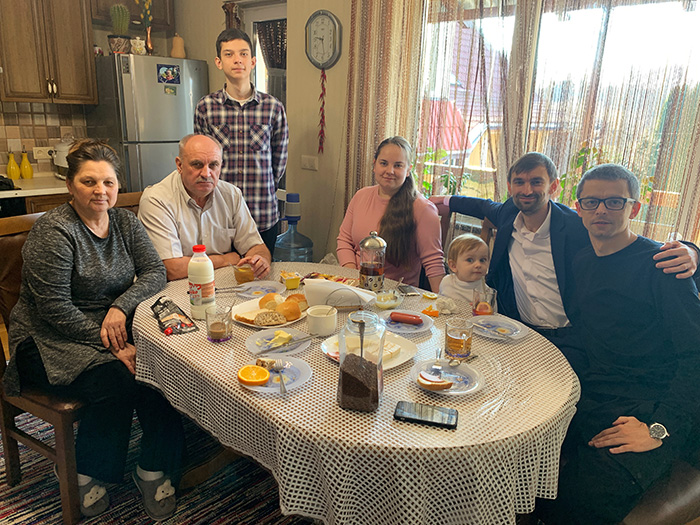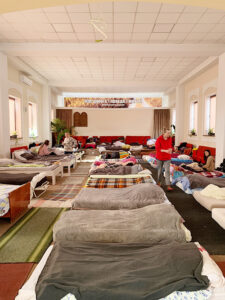Chronicle editor Mark Frost writes: Our son Max — reporting for RocaNews.com, the digital news company he founded with two friends in 2020 — crossed the border from Poland into Ukraine on March 4, hitchhiking with a driver transporting relief supplies. The man invited Max to stay in his three-generation household as long as Max wanted. Max stayed three nights, four days.

After the third day, Max Facetimed with us. I started taking notes.
Mark: Are they scared?
Max: No.
Mark: Are they naive?
Max: They’re religious.
Max went to the Christian church with the family on that Saturday. The service lasted three hours. The church is lodging people who’ve fled to this province, Zakarpatiya, close to Poland, Romania, Hungary in Ukraine’s west.

Speakers at the service included some of the refugees. The service was conducted some in Ukrainian, some in Russian, some in local Zakarpatiya dialect that Max said brings in Hungarian, Polish, Ukrainian, Slovakian, Romanian.
Max said his host stood and asked that everyone speak in Russian so Max and others could understand it.
Max said everyone in Ukraine speaks Russian, though many prefer not to. Max speaks Russian, not Ukrainian.
On Thursday night, Max said he was awakened out of a deep sleep at 3:30 a.m.
His host burst into his room, speaking Russian urgently, showing on his phone that the Russians had bombed a nuclear plant. “Worse than Chernobyl,” the man feared.
Max said refugees included “a lot of men who drop their family off at the border and come back. They can’t leave. They’re not gonna get out. The men are stuck.”
He said his host drove him up to a resort town in the mountains that would normally be empty at this time of year.
Now there were “many cars,” many refugees staying in rooms there.
A woman tells Max she won’t leave — “not until the last day I can, because I want to stay with him,” her husband.
Max told of meeting a poor man, alone now, whose family was killed in eastern Ukraine.
Max noted, “The people who are leaving abroad are more well-heeled. Most Ukrainians are poor. The average income of a Ukrainian may be as low as $200 a month. Ukraine is rural.”
Max said the value of Ukrainian money was plunging.
“What took 36 hryvnia to buy in exchange yesterday takes 40 today. Each day people’s savings lose 10% of their value.”
The family of the driver that Max met by chance provided him lodging, food, transportation, all for free. Max says he spent a total of $6 in Ukraine.
“They’re extremely hospitable,” Max said. But “there’s nothing to do. School’s cancelled, work’s cancelled. The market is open.”
Max remarked, “Most people aren’t gonna fight. Most people don’t want to fight. They want to live their life. They want to help where they can,” like “gathering food for the soldiers.”
“Most people just want to survive and get on with things,” Max said.
Max said AK-47 automatic rifles are being distributed. He sees teenagers carrying them.
Max has been to Ukraine several times. He is comfortable with the country and the people.
“The Ukrainians I would be friends with back home,” he said. “The Russians are different.” Many are materialistic.
Should the U.S. and the West hold back in military support for fear of escalating the Ukraine conflict into a world war?
“For someone who lives in Kyiv (Kiev in Russian), what difference does it make if there’s a world war?” Max asks. For them it’s essentially a world war right now.
Max suggests the West left Ukraine out to dry. “They’re on the path to join NATO but they didn’t join NATO,” so they became more a target for Putin but without the protection of being a NATO member.
“I don’t know how long people are gonna care what happens here,” says Max.
In Syria, he said, the war is “11 years there and it’s worse. It’s still going on.”
And no one pays attention.
“I met a guy at the border of Poland. He was born in Russia. He is Jewish. He lives in Germany but grew up in Israel.
“He said ‘Russia needs to be destroyed. It needs to be ripped apart.’”
He said “it represses its people” and “has not contributed anything to the world in centuries. All it knows is how to destroy things.”
“There’s no reason to think Putin will stop here,” Max said. “History says he will not….What’s to stop them from doing the same thing in Georgia, Kazakhstan. Where’s it gonna stop?”
Max doubts the West’s resolve if Russia invades another of its former satellites, for instance, Lithuania, which is a member of NATO and which the U.S. and its allies are obligated by treaty to defend.
“Do you think Americans will want to fight for them? Not a chance, not a chance,” Max said.
Max planned to leave Ukraine the next day, via Romania. His immediate destination was a historic town called Cluj Napoca. He says Robert Kaplan, one of his favorite authors, wrote about it in a book called Balkan Ghosts.
Max planned to connect with two Romanian “Roca Riders” — people following Rocanews. One offered him a place to stay, the other invited him for a beer.
He flew back to the U.S. a few days later.
Before Max left Ukraine, he spoke to us via Facetime. We heard the father of the family saying things in Russian for Max to translate to us.
“The war will be over soon,” the man wanted us to know. “There won’t be any Putin and you’ll be free to visit.”
The man came back to within earshot and added, “Putin, he brought the whole world together.”
Copyright © 2022 Lone Oak Publishing Co., Inc. All Rights Reserved
 Glens Falls Chronicle Serving the Glens Falls/Lake George region; Warren, Washington and northern Saratoga counties since 1980
Glens Falls Chronicle Serving the Glens Falls/Lake George region; Warren, Washington and northern Saratoga counties since 1980


